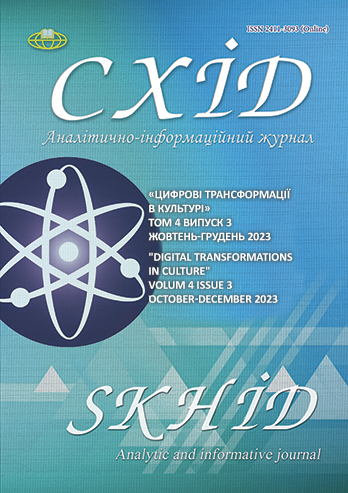Virtualization of culture as a defining trend development of modern society
DOI:
https://doi.org/10.21847/2411-3093.2023.4(3).296708Keywords:
Virtual Reality Culture, Information and Communication Technology, Digitisation, Contemporary Culture, Artificial IntellectAbstract
The article analyses various aspects of the modern society’s development related to the virtualisation of culture: the educational process, the cultural industries, the artistic sphere, the use of artificial intellect (AI) and artificial intellect and commemorative practices. The authors describe the origin of the term "virtuality" and its evolution in a scientific discourse. The emergence and evolution of the phenomenon of virtuality is connected to the development of information and communication technologies (ICT). The concept of "virtuality" is considered as an information and technical space, a technically mediated environment, an information resource of modern society and a media environment of culture. On the basis of the methodological approaches by the world’s researchers of the information society M. McLuhan and M. Castells, to the formation of a new type of culture, it is concluded that the intensification of the virtualisation process gradually leads to the replacement of the real subject space by the space of images, symbols and signs in many socially important spheres of human activity. It is shown that virtualisation contributes to the creation of innovative technologies of cultural and interpersonal communication and offers a new form of interaction with artefacts that have a virtual representation. The article highlights the increasing hybridisation of online and offline spaces, the transformation of the Internet into a space of human communication, everyday activities and entertainment. The authors note that modern innovations cannot replace the effect of a "live visit", but thanks to digital progress and widespread digitalisation, the development of 3D technologies, people have the opportunity to react emotionally to world events by being virtually in the centre of them. Virtualisation is seen as a new technology of representation that will largely determine the cultural experience of humanity in the nearest future. The authors show that the Internet now appears to users as an integrator of all spheres of social reproduction, and that various forms of cultural convergence and networking are being recorded in the Global Web. The benefits, threats and risks of the widespread use of modern information products are examined.
Downloads
References
‘AI’ named most notable word of 2023 by Collins dic-tionary. URL:https://www.theguardian.com/technology/2023/nov/01/ai-named-most-notable-word-of-2023-by-collins-dictionary
Baudrillard, Jean (2004). Simulacra and Simulation (transl. from French). Kyiv (In Ukrainian).
Borisikhina, K. (2022, 02 September). Khudozhnyky lyutuyut. Stvorena shtuchnym intelektom kartyna vpershe peremohla na konkursi [Artists rage. The picture created by artificial intelligence won the com-petition for the first time], VYDAVNYCHYY DIM ME-DIA-DK LLC URL:https://techno.nv.ua/ukr/it-industry/stvorena-shtuchnim-intelektom-kartina-peremogla-na-velikomu-konkursi-hudozhnikiv-50267392.html (In Ukrainian)
Buriak, V.V. (2011). Dynamika kultury v epokhu hlobalizatsii: noosfernyi kontekst. Simferopol: DIAIPI. (in Ukrainian).
Castells, M. (2000). The Rise of the Network Society, the Information Age: Economy, Society and Culture. Oxford: Oxford University Press.
Castells, M. (2001). The Internet Galaxy. Reflections on the Internet, Business and Society. Oxford UP
Cecotti, H. (2022). Cultural Heritage in Fully Immersive Virtual Reality. Virtual Worlds. 1(1), 82-102; https://doi.org/10.3390/virtualworlds1010006
Deleuze, J. (1958). Empirisme et subjectivité: essai de Hume sur la nature humaine. Revue Philosophique de la France Et de l'Etranger . URL: https://philpapers.org/rec/DELEES-3 (In French).
Deleuze, J. (1969). Logique du sens. Les éditions de Minuit. Paris. p. 11-437 (In French).
Fidas, C. and Sylaiou, S. (2021). Editorial for Special Issue “Virtual Reality and Its Application in Cultural Heritage”. Appl. Sci, 11(4), 1530; https://doi.org/10.3390/-app11041530
How virtual reality is being used to recreate Iraq’s de-stroyed heritage. URL: https://www.thenationalnews.com/arts-culture/art/2022/11/24/how-virtual-reality-is-being-used-to-recreate-iraqs-destroyed-heritage/
Rothman, J. (2018). Are We Already Living in Virtual Reality?A new technology - virtual embodiment - challenges our understanding of who and what we are. URL: https://www.newyorker.com/magazine/2018/04/02/are-we-already-living-in-virtual-reality
Volynets, V. (2023). The Impact of Artificial Intelligence on Contemporary Art: Opportunities and Challenges. Digital Platform: Information Technologies in Sociocultural Sphere, 6(1), 21–31. https://doi.org/10.31866/2617-796X.6.1.2023.283933
Volynets, V.O. (2014). Virtualnist yak oznaka suchasnoho kulturnoho rozvytku. Aktualni problemy istorii, teorii ta praktyky khudozhnoi kultury. 32б 151-157. (in Ukrainian)
Žižek, S. (2004). The body without organs. New York, London: Routledge. 217 p.
Downloads
Published
How to Cite
Issue
Section
License
Copyright (c) 2024 Inna Hurova, Ольга Добродум

This work is licensed under a Creative Commons Attribution-NonCommercial-NoDerivatives 4.0 International License.
1. Authors bear responsibility for the accuracy of facts, quotations, numbers and names used.
2. Manuscripts are not sent back.
3. The publisher does not always agree with the authors' opinion.
4. The authors reserve the right to authorship of the work and pass the first publication right of this work to the journal under the terms of a Creative Commons Attribution-NonCommercial-NoDerivatives 4.0 International License. This license allows others to distribute (copy) the published work for non-commercial purposes, provided there is mandatory attribution to its authors and a link to the first publication in our journal.
5. The authors have the right to conclude separate supplement agreements that relate to non-exclusive work distribution in the form in which it has been published by the journal (for example, to upload the work to the online storage of the journal or publish it as part of a monograph), provided that the reference to the first publication of the work in this journal is included.

